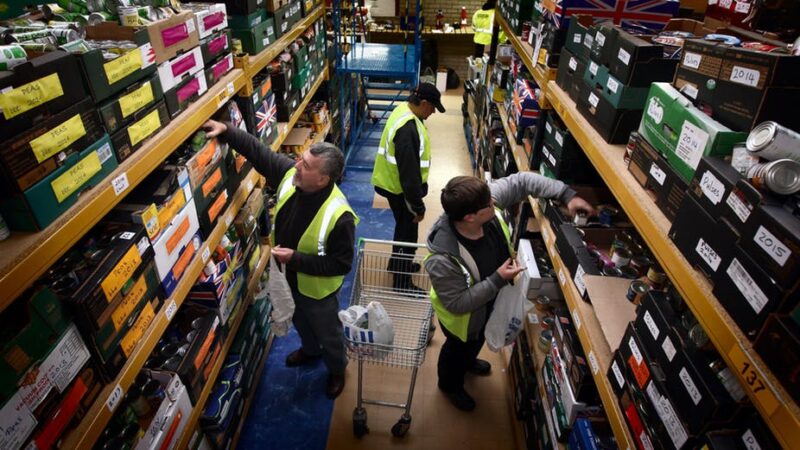“We have people ringing up who have just one tin of baked beans. It’s ridiculous."

“There was a disabled man who rang up – he’d just come out of hospital. The council gave him one food package and told him that was it. He couldn’t leave the house.”
It’s stories like this that keep Selina Treuherz, 21, going during this crisis. There are gaping holes in Britain’s welfare safety net: and people are going hungry.
Treuherz is a volunteer coordinator for the National Food Service – a non-profit network trying to tackle food poverty, and build social solidarity.
Since 2018, NFS branches have coordinated ‘social eating spaces’ across the country, and now has 13 branches from Glasgow to Falmouth. It is, LFF is told, ‘by-and-for the communities it serves’.
The difference to food banks? Britain’s noble network of food banks (of which the Trussell Trust is the biggest) operate on a referral service: you have to be referred by a voluntary of public service such as a GP or social worker.
At NFS’ social eating spaces, anyone could go to and get a hot meal, and contribute in ways that worked for them. Then coronavirus came along. Unable to operate its food halls, NFS is now delivering to people across the country. Some branches also have welfare helplines.
It’s built on a slogan: “Solidarity not sympathy” – and seems to have caught on. In Sheffield there are about 500 volunteers, Treuherz tells me. “So many people are signing up. We’ve seen a surge in volunteers wanting to help us – but also a surge in people needing our support. The government response just isn’t good enough,” she says.
The NHS’ volunteering service saw over 700,000 applications – but has struggled to offer everyone volunteering opportunities. Earlier this month it was dishing out around 3,000 tasks a day – a fraction of its volunteering capacity.
Who are the people who slip between the gaps in the existing welfare system? “People come to us on Universal Credit who have no money – but it’s seen as not good enough reason for the council. A lot of the food banks have shut down. People don’t have their usual form of provision,” Treuherz tells LFF.
NFS also works with people with addiction or mental health issues, who have struggled with provision through ‘traditional’ charities. With many people suffering pay cuts or losing their jobs, there are a lot of people on the breadline now.
Research by the Food Foundation shows that three million people are going hungry during this lockdown – a huge challenge for both public services and non-profits.
“We have people ringing up with one tin of baked beans. It’s ridiculous,” Treuherz says. “Why wouldn’t you help people in these situations if you are privileged?”
NFS is one of many networks founded on the principle of mutual aid: communities organising to help each other out, without the direct involvement of the state.
“We’re not campaigning for the state to build a National Food Service – it already exists. We want one in every city, so everybody gets the opportunity to have a hot meal provided for them and a community.”
But in the crisis, there’s also an opportunity for change. “People are starting to realise the importance of mutual aid.” Treuherz says she has ‘kind of dropped’ her degree to volunteer with NFS most days.
It’s more than just a food parcel service though. “Providing hot meals is just the input, not the output. The output is bringing people together. At branches, people used to help ach other sort council forms, deal with grievances, people come to talk – they come for the meal and get a lot out of it.” Without being able to meet in person, phone lines and emails have taken over.
Sheffield’s food hall has apparently distributed 3,000 meals since the 23rd March, working with charities. Clearly there is huge demand. “There are so many barriers you have to overcome to get food support from the government. The parcels they’re giving aren’t sustainable or nutritionally very good. They should be using organisations like us.”
The government has now offered grant funding worth over £3m to charities to distribute food during the pandemic – but many fear it will barely scratch the surface of what is needed.
Where next for the National Food Service? The network are ‘always looking for people or organisations looking to become a branch, and we support them to make that happen.’ A ‘symposium’ in September will show far the group has come since 2018. “We’re going to carry on building branches across the country until we’re in every city,” Treuherz says.
Despite the realities of poverty in Britain today, Treuherz is inspired by other food activists. “It’s really exciting to be involved in this right now!”
To get involved, fill in the form online. Volunteers can cook, help with local branch, work on the website or their data team.
Left Foot Forward doesn't have the backing of big business or billionaires. We rely on the kind and generous support of ordinary people like you.
You can support hard-hitting journalism that holds the right to account, provides a forum for debate among progressives, and covers the stories the rest of the media ignore. Donate today.



